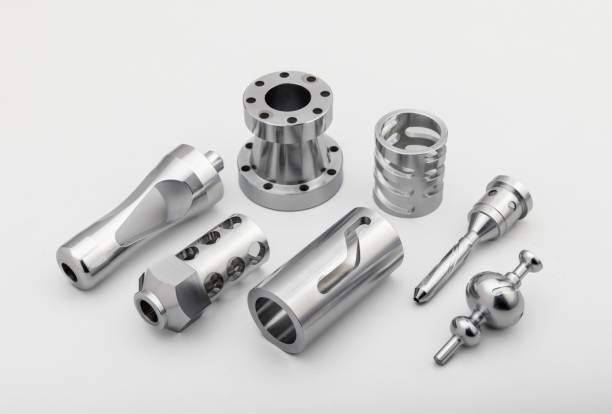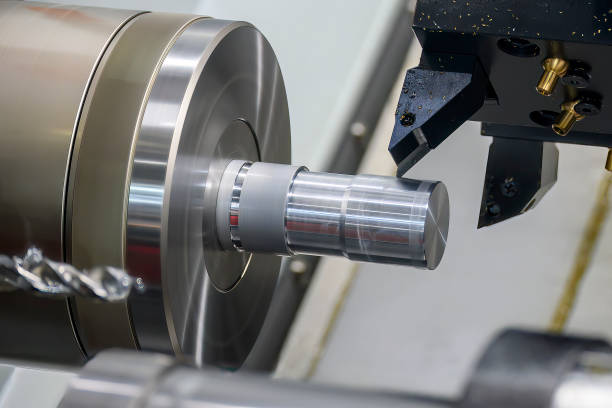the CNC lathe machine forming cutting the metal shaft parts
Meta Description: How strong is CNC metal? Click here to learn the key benefits and applications of CNC metal, highlighting its versatility across various industries.
The strength of metal material is often at the top of the consideration list in manufacturing. After all, you don’t want the manufacturing process to weaken the metal and cause issues down the road. CNC metal machining is a popular method used to cut, shape, and mold metals with precision, and it remains the go-to manufacturing process for many industries. But does all that cutting and shaping affect the metal’s strength? That’s a question many people ask when considering CNC for their projects. Keep reading to find out what CNC metal is and whether the process impacts its strength.
What Is CNC Metal?
CNC metal refers to any metal shaped, cut, or formed using a CNC machine. CNC stands for Computer Numerical Control, which means a computer is programmed to precisely control the machine’s movements. The beauty of CNC machining is that it can work with a wide range of metals like aluminum, steel, brass, and even titanium. The process allows for highly accurate cuts and shapes, making it perfect for parts with complex designs or needing to fit together seamlessly.
Unlike traditional methods, where tools are operated manually, CNC machining eliminates guesswork. The computer controls every process, so the risk of human error is significantly reduced. This also means the final metal product is precise, has a smooth finish, and is made to exact specifications. CNC metal machining is trusted across industries because it consistently delivers accurate results while handling delicate and challenging tasks. Moreover, its versatility and precision make it a go-to solution for manufacturers who need things done right, no matter the project size.
Will CNC Machining Affect the Strength of Metal?

strong metal workpiece undergoing bending
CNC machining does not weaken metal. In fact, the process helps retain the original strength of your metal material. CNC machining involves cutting, shaping, or drilling metal using computer-guided tools. Still, it doesn’t involve any processes like heating or melting that could alter the material’s structure. The metal remains as strong as before machining, a massive advantage for industries that rely on durable parts.
Also, when working with tight tolerances, CNC machining allows for precision that helps avoid weak spots or stress points in the final product. However, the strength of CNC-machined metal can also depend on the type or grade of metal used and how it’s machined. Softer metals like aluminum might not have the same level of durability as harder metals like steel, but the process ensures that the metal’s integrity doesn’t get compromised.
Benefits of CNC Metal
CNC metal has numerous advantages that make it ideal for various industries. Let’s examine them.
Precision and Accuracy
CNC machining is known for its incredible precision. CNC machines are programmed to cut and shape metal with high accuracy, down to fractions of a millimeter. In other words, with CNC, you can trust that each cut will be precise, ensuring tight tolerances and reducing the need for extensive finishing work later. This high precision is vital for industries where exact dimensions are critical, such as medical manufacturing.
Consistency and Repeatability
Once the machine is programmed, it can produce the same part repeatedly with the same quality. This consistency is crucial for companies that need to fabricate hundreds or thousands of identical parts quickly. You don’t have to worry about variations, which means more reliable and quality products.
Strength and Durability
Metals like aluminum, steel, and titanium retain their strength when machined with CNC technology. These materials are known for their durability, and CNC processing enhances their ability to withstand stress, heat, and corrosion. This makes CNC metal parts ideal for applications requiring long-lasting, tough components.
Efficiency and Speed
The automated nature of CNC metal machining allows for faster production times than manual methods. CNC machines can run continuously without breaks, producing parts around the clock. This speeds up production and lowers costs by reducing labor time. Companies can produce quality metal parts quicker, which leads to faster project delivery times.
Versatility Across Metals
CNC machining works well with various metals, from softer ones like aluminum to harder ones like stainless steel and titanium. This versatility means you can use CNC to create parts from the exact metal that fits your needs, whether you’re looking for lightweight, corrosion-resistant aluminum or heavy-duty steel.
Reduced Human Error
Since CNC machines are fully automated, the risk of human error is significantly reduced. Everything is controlled by computer programming, which ensures that each cut and movement is perfectly executed. This minimizes mistakes and increases the overall quality of the parts produced.
Applications of CNC Metal

precise CNC-turned metal parts
The strength, precision, and reliability of CNC metal make it a top choice for various manufacturing needs. So, it has become a go-to solution for various industries.
Here are some of the key areas where CNC metal stands out:
Aerospace Components
Airplanes and spacecraft need parts that can handle extreme conditions, including high speeds, temperature changes, and constant pressure. CNC machining perfectly handles and delivers these parts, producing components like engine parts, structural supports, and landing gear with tight tolerances. Since these parts are mission-critical, they need to be solid and accurate, and CNC metal delivers on both fronts.
Automotive Parts
The automotive industry depends heavily on CNC metal for manufacturing parts that go into our cars. These parts must be sturdy and consistent, as even a minor flaw can affect a vehicle’s performance. CNC machining ensures that each part is identical and meets the high standards required in mass production. This is why automakers use CNC machining for everything from engine components to brake systems.
Medical Devices
CNC metal is also crucial in the medical field, where precision can mean the difference between life and death. Surgical instruments, prosthetic implants, and dental devices are all made using CNC machining. These parts need to be perfectly shaped and made from biocompatible materials, such as titanium or stainless steel. CNC machining offers the accuracy and surface finish required to ensure that medical devices work as intended and can be safely used inside the human body.
Electronics Industry
If you’ve ever opened up a laptop or smartphone, then you’ve probably seen CNC metal at work. Manufacturers apply CNC machining to make the metal housings, frames, and heat sinks that protect and cool your devices. Besides, electronics need parts that are lightweight and, at the same time, strong enough to withstand daily use.
Industrial Machinery
Industrial machines need rigid, durable components to handle heavy workloads. CNC metal plays a key role here by producing gears, shafts, and other critical parts. These components are often subjected to high levels of wear and tear, so they need to be made from materials that can handle intense usage. CNC machining ensures that these parts are strong, wear-resistant, and built to last, keeping the machines running smoothly.
Prototyping and Custom Parts
For companies developing new products, CNC machining is an excellent option for prototyping. CNC metal offers the flexibility and accuracy you need for a one-off part or to test a new design or a custom component for a particular application. It’s fast and precise and can produce quality prototypes that go straight from the design drawings to real-world testing.
Conclusion
CNC metal remains vital in modern manufacturing. It offers strength, precision, and versatility. CNC metal is the go-to option when you need strong, long-lasting parts, whether for planes, cars, or even medical tools. CNC metal machining can handle complex designs and tight tolerances and this makes it perfect for jobs that demand accuracy. Overall, CNC metal guarantees reliable, high-quality results when working on large-scale production or a few custom pieces.
Choose a CNC machining company that puts performance and reliability first. At Zintilon, we handle and deliver quality, precision-engineered metal parts tailored to your exact needs. Whether it’s a custom job or large-scale production, trust our team to make it happen. So, contact today us today to get started!


















+ There are no comments
Add yours